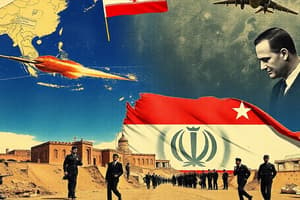Podcast
Questions and Answers
Which of the following best describes George H.W. Bush's promise during the 1988 election?
Which of the following best describes George H.W. Bush's promise during the 1988 election?
- To decrease military spending and focus on domestic issues.
- To prioritize environmental protection and renewable energy.
- To raise taxes to balance the budget.
- To continue the policies of the Reagan administration with low taxes, a tough stance on crime, and strong defense. (correct)
Operation Desert Storm in 1991 resulted in the removal of Saddam Hussein from power in Iraq.
Operation Desert Storm in 1991 resulted in the removal of Saddam Hussein from power in Iraq.
False (B)
What was the significance of Ross Perot's performance in the 1992 election?
What was the significance of Ross Perot's performance in the 1992 election?
He garnered nearly 20% of the vote, a huge showing for a third-party candidate.
The Clinton administration's policy regarding gays in the military, known as "______", was an attempt to lift the ban but ultimately resulted in a compromise.
The Clinton administration's policy regarding gays in the military, known as "______", was an attempt to lift the ban but ultimately resulted in a compromise.
Match the following events with their effects on domestic policy during the Clinton administration:
Match the following events with their effects on domestic policy during the Clinton administration:
What was the primary criticism of NAFTA (North American Free Trade Agreement) when it was enacted in 1994?
What was the primary criticism of NAFTA (North American Free Trade Agreement) when it was enacted in 1994?
Bill Clinton was removed from office as a result of his impeachment trial in 1999.
Bill Clinton was removed from office as a result of his impeachment trial in 1999.
What was the central controversy surrounding the 2000 presidential election?
What was the central controversy surrounding the 2000 presidential election?
Following the September 11th attacks, the Bush administration passed the ______ Act, which expanded surveillance and detention powers.
Following the September 11th attacks, the Bush administration passed the ______ Act, which expanded surveillance and detention powers.
Match the following events with their corresponding presidential administration:
Match the following events with their corresponding presidential administration:
What was the stated justification for the U.S. invasion of Iraq in 2003?
What was the stated justification for the U.S. invasion of Iraq in 2003?
The George W. Bush administration's tax cuts led to a decrease in the national debt.
The George W. Bush administration's tax cuts led to a decrease in the national debt.
What was the main point made by Kennedy about the U.S. by the 21st century?
What was the main point made by Kennedy about the U.S. by the 21st century?
Clarence Thomas' Supreme Court nomination process was contentious due to accusations of sexual harassment by ______.
Clarence Thomas' Supreme Court nomination process was contentious due to accusations of sexual harassment by ______.
Match the following political figures with their roles in the 1988 or 1992 presidential elections:
Match the following political figures with their roles in the 1988 or 1992 presidential elections:
Which of the following was a significant foreign policy challenge during the Clinton administration?
Which of the following was a significant foreign policy challenge during the Clinton administration?
The U.S. successfully captured Osama bin Laden in Afghanistan shortly after the 2001 invasion.
The U.S. successfully captured Osama bin Laden in Afghanistan shortly after the 2001 invasion.
Name one major social or demographic shift that occurred in the U.S. during the late 1980s to early 2000s.
Name one major social or demographic shift that occurred in the U.S. during the late 1980s to early 2000s.
The Supreme Court halted the recount in ______ during the 2000 election, effectively awarding the presidency to George W. Bush.
The Supreme Court halted the recount in ______ during the 2000 election, effectively awarding the presidency to George W. Bush.
Match the following George W. Bush administration policies with their descriptions:
Match the following George W. Bush administration policies with their descriptions:
Flashcards
Michael Dukakis
Michael Dukakis
The Democratic candidate in the 1988 election; Governor of Massachusetts.
Read my lips: no new taxes
Read my lips: no new taxes
George H.W. Bush's campaign promise during the 1988 election.
Operation Desert Storm
Operation Desert Storm
Military operation in 1991 to expel Iraqi forces from Kuwait.
Ross Perot
Ross Perot
Signup and view all the flashcards
Don’t Ask, Don’t Tell
Don’t Ask, Don’t Tell
Signup and view all the flashcards
NAFTA
NAFTA
Signup and view all the flashcards
Oklahoma City Bombing
Oklahoma City Bombing
Signup and view all the flashcards
Lewinsky Affair
Lewinsky Affair
Signup and view all the flashcards
Election of 2000 Controversy
Election of 2000 Controversy
Signup and view all the flashcards
$1.3 Trillion Tax Cut
$1.3 Trillion Tax Cut
Signup and view all the flashcards
September 11, 2001
September 11, 2001
Signup and view all the flashcards
The Patriot Act
The Patriot Act
Signup and view all the flashcards
Iraq War
Iraq War
Signup and view all the flashcards
Study Notes
- Study notes for US History from the late 1980s to the early 2000s
Election of 1988
- Michael Dukakis, the Democratic candidate and Governor of Massachusetts, was perceived as lacking emotional appeal.
- Jesse Jackson's "rainbow coalition" gained momentum but did not lead to a nomination.
- George H.W. Bush, Reagan’s VP, ran on a platform of low taxes, being tough on crime, and maintaining a strong defense.
- Bush won the election with 426 electoral votes to Dukakis' 111.
George H.W. Bush Presidency (1989–1993)
- Bush was from a wealthy New England family and a Yale graduate.
- Bush served as a WWII naval aviator and made a fortune in Texas oil.
- He previously served as a Congressman, UN Ambassador, CIA Director, and VP.
Foreign Policy: The Persian Gulf War
- Iraq invaded Kuwait in August 1990 seeking oil and debt relief after the Iran-Iraq War, leading to global condemnation.
- Operation Desert Storm (January–February 1991) involved a coalition of over 800,000 troops, including 500,000 from the U.S.
- General Norman Schwarzkopf led the operation
- Iraq was expelled from Kuwait, but Saddam Hussein remained in power.
Domestic Policy
- Bush called for a “Kinder, gentler America.”
- Clarence Thomas' Supreme Court nomination was controversial due to Anita Hill's accusations of sexual harassment.
- The hearings sparked a national debate on race, gender, and workplace ethics.
- Bush's broken promise of "Read my lips: No new taxes" and a recession led to a drop in approval ratings, with unemployment exceeding 7% by 1992.
Election of 1992
- Bill Clinton, the Democratic candidate and Governor of Arkansas, ran on a "New Democrat" platform focused on economic growth, welfare reform, and healthcare.
- Ross Perot, an independent candidate, gained nearly 20% of the vote.
- Clinton won the election with 370 electoral votes to Bush's 178
- Democrats also took control of Congress.
The Clinton Presidency (1993–2001)
- Domestic Policy
- "Don’t Ask, Don’t Tell" (1993) was a compromise policy regarding gays in the military, where the military couldn't ask about orientation, and service members couldn't disclose it.
- It was repealed in 2010.
- Hillary Clinton led the healthcare reform effort, proposing that all employers provide insurance.
- The proposal was opposed and failed to pass in Congress.
- A tech boom and rising revenues helped balance the budget, leading to the first balanced budget in 30 years by 1998.
- A Crime Bill banned assault weapons.
- The Waco Siege (1993), Oklahoma City Bombing (1995), and Columbine (1999) shootings influenced policy and national debates.
Foreign Policy
- NAFTA (1994) created no tariffs between the U.S., Mexico, and Canada.
- It was criticized by labor unions fearing job losses and was a symbol of globalization.
- Clinton prioritized trade with China despite human rights concerns.
- This led to large trade deficits.
- The U.S. withdrew from Somalia (1993) after troop deaths.
- The U.S. did not intervene in the Rwanda genocide (1994–1995).
- NATO intervened in Bosnia/Kosovo against Serbian ethnic cleansing, leading to Slobodan Milosevic's arrest and trial.
Impeachment Scandal
- The Whitewater land deal led to no charges against the Clintons.
- Clinton was impeached by the House for perjury and obstruction related to the Lewinsky Affair but was acquitted by the Senate in 1999.
- Public disapproved of personal behavior but supported job performance.
Transition: Election of 2000
- Al Gore, the Democratic candidate and Clinton's VP, was considered lacking in charisma.
- George W. Bush, the Republican candidate and Governor of Texas, promised tax cuts and compassionate conservatism.
- The election was highly contested, particularly in Florida, where Bush won by only 537 votes after a Supreme Court decision stopped a recount, leading to Bush winning the Electoral College 271–266.
- Gore won the popular vote by over 500,000 votes.
George W. Bush Presidency (2001–2009)
- Early Domestic Policy
- Bush implemented a $1.3 trillion tax cut, which turned the budget surplus into a deficit.
- Global funding was withdrawn from clinics offering abortions, stem cell research was limited, and environmental science on climate change was ignored in favor of the oil industry.
September 11, 2001
- Al Qaeda launched coordinated attacks on the World Trade Center and Pentagon.
- The attacks killed over 3,000 people.
- Bush emphasized unity, Muslim tolerance, and counterterrorism.
The Patriot Act
- This act expanded surveillance and detention powers.
- It was controversial for infringing on civil liberties.
- It led to indefinite detainment and reports of torture at Guantanamo Bay.
War on Terror
- In Afghanistan (2001), the Taliban refused to hand over Osama bin Laden, leading to a U.S. invasion that toppled the regime within 3 months.
- Bin Laden remained at large until 2011.
- The Iraq War (2003) started with claims that Iraq had WMDs and links to terrorism, leading to the toppling of Saddam Hussein.
- No WMDs were found, which resulted in a long, costly occupation.
- The U.S. handed over power in 2004 and fully withdrew in 2011.
Social & Demographic Changes
- Major Divides
- Political: Abortion, LGBTQ+ rights, and climate change.
- Economic: Recession, rising income inequality, and globalization.
- Technological: The Internet transformed work and communication
- Immigration:
- Shift toward Latin America & Asia.
- Nearly 1 million/year; heavily impacted Southwest.
- Sparked backlash and reform debates.
Studying That Suits You
Use AI to generate personalized quizzes and flashcards to suit your learning preferences.




